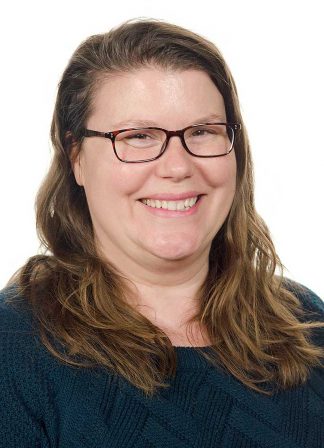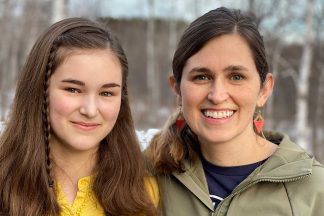By Allison Campbell-Jensen
A pesky virus cannot stop History Day competitions, coordinated by the Minnesota Historical Society. They will be happening this year, and the University Libraries will again have a part to play. In recent years, about 3,000 middle- and high-school students typically came to Wilson Library for research field trips. But now only University faculty, staff, and students can be admitted to Wilson, so a new avenue had to be found.
There is one aspect the students will really miss, says Ron Hustvedt, a middle school social studies teacher from Elk River and dedicated History Day teacher. For most of the students whom he has been leading on research field trips, this has been their first time on a college campus.
Negotiating for resources
To come to these students, virtually, the Libraries’ Richmond Kinney sought to connect students to Libraries resources — most of which are licensed only for current U of M students, faculty, and staff. Kinney, who helps coordinate History Day at the Libraries, had asked to open access to selected databases from November through May. She began with a general request to five vendors, then narrowed it down to the specific databases most relevant to History Day research.
“I was able to talk all of them into at least two months,” Kinney says, “and with a couple of them, there’s an option to extend that.” History Day students and educators just need to ask for permission to gain access.
The theme for History Day this year is Communication in History. The Libraries History Day resources, covering a wide variety of topics and time periods, include American Indian Newspapers, African American Newspapers, Life Magazine Archive, Supreme Court records, INS immigration records, and more.
“The part of the project that makes me the happiest and I’m most proud of is that all the students can access these databases,” Kinney says. It’s not limited to students from the metro-area schools or those who can afford to travel.
Similarly, staff in the Libraries’ Minitex division are available to all with internet access who take part in research Hullabaloos — and other Libraries staff help at the U-based Gopherbaloo. These events include mini-lessons, research help, and power conferences. Minitex staff guide students in searching eLibraryMN during each Hullabaloo. Minitex and others staff special AskMN libraries chat lines for students seeking History Day aid. Minitex also has committed to virtual librarian visits in classrooms upon request.
Training student researchers
“The part of the project that makes me the happiest and I’m most proud of is that all the students can access these databases.”
—Richmond Kinney
Hustvedt has been bringing students to Wilson Library for 12 years — for the last seven years, as many as 500 have visited. Recruitment continues to be strong this year, too.
“History Day is very customizable for students,” he says, “So it’s a perfect fit for distance learning.”
The students already have a high level of interest and there’s a tremendous amount of content they can access online, including the Libraries’ databases selected for them. Along with learning about their specific topics, students also have to place them in historical context, Hustvedt says.
Students now are doing preliminary research in databases — “there are some fantastic ones at the U,” Husvedt says — and he enjoys helping them dig into topics. They also have access to mentors at the Minnesota Historical Society and from colleges around the state.
It’s great to witness the “evolution of students,” Husvedt says. In middle school, they are used to being assigned projects and taking information that is given to them. They strengthen their skills and confidence as they take control of finding information themselves, determining their sources’ bias or reliability, deciding whether to narrow their search or broaden it.
“They are released to explore and get that mindset of a researcher,” Husvedt says. Follow-up surveys show the students continue to benefit from the research skills they’ve gained throughout high school and college
A student perspective
Last year, student Anwen Winter of Duluth made it all the way to the History Day national competition. She presented a performance about a Federal Writers’ Project program collecting former slaves’ narratives and the problems it encountered. This year, she will be researching the original “War of the Worlds” radio broadcast in 1938, which caused many to panic who did not know the story of aliens landing on Earth was fiction. “So, miscommunication,” Anwen says.
She’s attended a couple of virtual Hullabaloo sessions and is excited to have librarians ready to help via the chat line. She and her younger sister also have U of M students as mentors this year, who are helpful motivators. Their mother, Sarah Winter, also is for the first time their History Day teacher.
“A lot of other things are so pared down and limited right now,” Sarah Winter says. “But they’ve done such a beautiful job making this feel like a very full History Day experience.”
Anwen also is enthusiastic about the Libraries’ offerings. “I just got access to the U of M library sources and they are probably the best databases I have found yet.”
So the Libraries continues to play a part in these History Day student projects.







